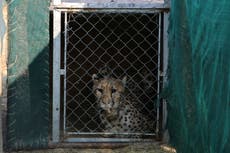India loses a cheetah to kidney disease within seven months of translocation from Namibia
Cheetah’s treatment history after blood test reveals high creatinine levels
India has lost one of the eight cheetahs it borrowed from Namibia under an ambitious translocation project to a kidney disease.
Sasha, the five-and-a-half year old female cheetah, succumbed to a kidney infection on Monday and was found dead in her cubicle in central India’s Kuno National Park where the Modi administration had brought eight wild cats in September last year.
In an official statement, authorities have said that Sasha was found lethargic on 22 January by the monitoring team in the park, following which the African cheetah’s health was inspected by three veterinarians who found out that she needed treatment.
The officials moved the female wild cat to a quarantine enclosure the same day and took her blood sample.
“A blood sample test revealed that Sasha had a kidney infection. Immediately a wildlife doctor and another specialist doctor from Van Vihar National Park, Bhopal were sent to Kuno National Park with a portable ultrasound machine. Sasha’s tests confirmed kidney disease,” the official statement said.
The cheetah’s treatment history after a blood test revealed high creatinine levels, according to Madhya Pradesh forest department officials.
The treatment history taken from the Cheetah Conservation Foundation, that helmed the Project Cheetah with the Indian administration after monitoring the Indian territory for more than a decade, has confirmed that the wild cat had a kidney disease before even arriving in India, the officials said in a statement.
One of the five females India had translocated under its contentious programme, Sasha was initially found on a farm near Gobabis, a town in east central Namibia, by farm workers in late 2017.
At the time Sasha was skinny and malnourished but was gradually nursed back to health.
Project Cheetah aims to repopulate India with the vulnerable animal some 74 years after they were hunted to extinction. After another translocation project on 18 February of 12 cheetahs, India is now hosting a total of 19 African wild cats brought from Namibia and South Africa.
These chosen cheetahs – five females and three males – were initially restricted to a paddock five sq kilometres (1.3 sq miles) in size where they were made to adapt to the water and air, flora and fauna of India.
Other seven cheetahs brought along with Sasha have now been released in the open forest area for free movement, officials have said, adding that they are enjoying free movement and are completely healthy and active. The wild cats are also able to hunt for their prey of deers normally.
The newly inducted batch of 12 cheetahs is still in quarantine, the officials said.
Join our commenting forum
Join thought-provoking conversations, follow other Independent readers and see their replies
Comments




Bookmark popover
Removed from bookmarks